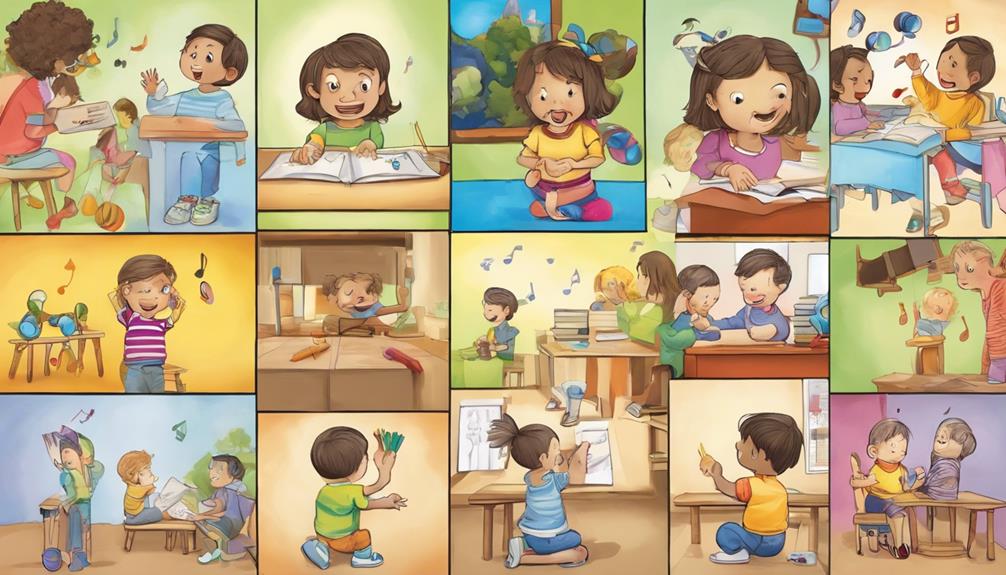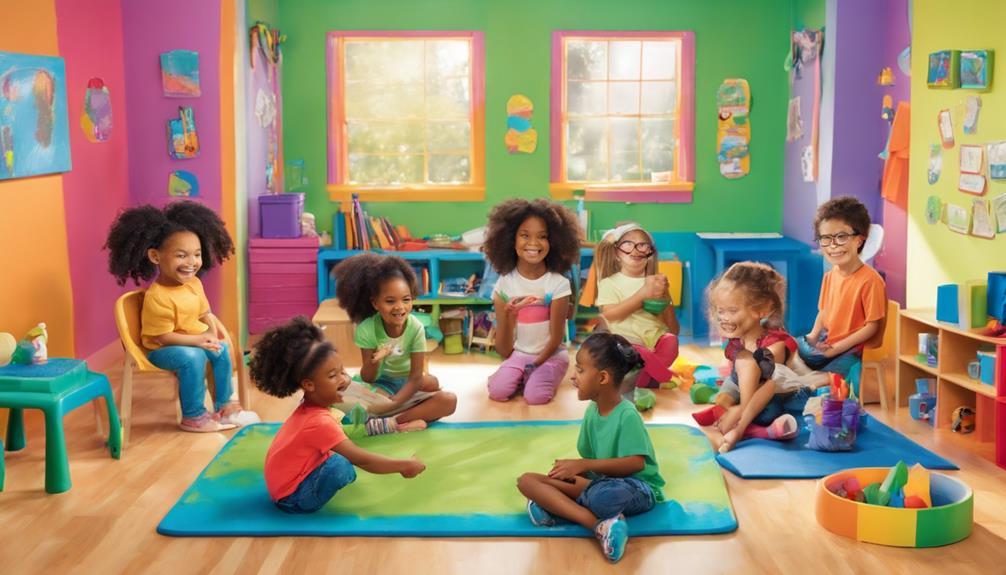As we enter the realm of Auditory Verbal Therapy Activities, envision a harmonious blend of sounds leading us towards improved listening abilities.
Through dynamic games and exercises, we embark on a journey to sharpen our auditory attention and detail-oriented focus.
Stay tuned as we uncover the transformative power of these activities in honing our ability to listen and comprehend with clarity.
Key Takeaways
- Auditory Verbal Therapy (AVT) enhances listening skills for improved communication.
- Activities in AVT target auditory processing skills crucial for language development.
- Integrating AVT into daily routines boosts natural language acquisition.
- Monitoring progress in AVT shows increased speech clarity and communication proficiency.
Importance of Listening Skills
Understanding the critical role that listening skills play in communication, learning, and social interactions is fundamental for recognizing their significance in various aspects of life. When engaging in auditory processing activities, we enhance our ability to comprehend, problem-solve, and perform better academically. Strong listening skills not only aid in understanding spoken language but also improve our cognitive functions. By actively participating in auditory processing tasks, we stimulate our brains to process information more efficiently, leading to better language development and overall cognitive performance.
Moreover, effective listening is the cornerstone of building strong relationships, as it reduces misunderstandings and fosters empathy. By honing our listening abilities through auditory processing activities, we can create deeper connections with others and communicate more effectively. These activities not only benefit individuals with hearing impairments or language delays but are also instrumental in enhancing the listening skills of everyone, thereby enriching our interactions and understanding of the world around us.
Understanding Auditory Verbal Therapy

Auditory verbal therapy is a specialized intervention focusing on developing listening and spoken language skills in individuals with hearing loss or auditory processing difficulties. One of the key components of this therapy is auditory training, which involves activities designed to improve how individuals perceive and interpret sounds. By emphasizing auditory training, auditory verbal therapy aims to optimize the use of hearing technology such as hearing aids or cochlear implants to enhance language development.
This evidence-based approach is personalized to address each individual's unique needs and communication goals. The ultimate objective of auditory verbal therapy is to help individuals understand and produce spoken language effectively through intensive auditory training sessions. By enhancing listening skills and promoting effective communication, auditory verbal therapy plays a crucial role in facilitating mainstream education and social integration for individuals with hearing loss or auditory processing difficulties.
Key Benefits of AVT Activities
Engaging in Auditory Verbal Therapy (AVT) activities offers children with hearing loss significant benefits in developing essential listening skills for improved communication and social interaction. One key benefit of AVT activities is the improvement in auditory memory. Through targeted exercises and interventions, children can enhance their ability to remember and process auditory information more effectively. This improvement in auditory memory not only aids in language development but also supports academic success by enabling better retention and understanding of spoken instructions and information.
Furthermore, AVT activities have been shown to boost speech, language, and auditory processing abilities in children with hearing loss. By actively engaging in these activities, children can make significant gains in their communication skills, leading to improved social interactions and overall quality of life. Research consistently supports the effectiveness of AVT in maximizing residual hearing and enhancing listening abilities, highlighting the importance of these activities in promoting spoken language development and academic achievements for children with hearing loss.
Targeting Auditory Processing Skills

Building upon the benefits of Auditory Verbal Therapy (AVT) activities, the focus now shifts towards honing specific auditory processing skills essential for improved communication and language development. Targeting auditory processing skills is crucial for enhancing speech perception, noise tolerance, phoneme discrimination, auditory memory, speech perception, auditory sequencing, and auditory processing speed. These skills play a vital role in the interpretation and understanding of spoken language effectively.
Engaging in activities that challenge these auditory processing skills, such as the basketball-inspired game, Viking throwing game, and ocean dive game, provide dynamic ways to improve listening abilities. Consistent practice with auditory verbal therapy activities not only sharpens these skills but also enhances overall communication abilities.
Incorporating AVT Into Daily Routine
Integrating AVT into our daily routines is crucial for maximizing the benefits of therapy for children with hearing loss.
By incorporating AVT activities into everyday tasks and schedules, we can provide consistent opportunities for practicing listening and spoken language skills.
This regular practice aids in strengthening auditory processing abilities and fostering natural communication development.
Daily AVT Integration
To enhance auditory processing and speech development consistently, daily incorporation of Auditory Verbal Therapy (AVT) activities into routines is essential. By integrating AVT exercises into daily activities, individuals can strengthen their listening skills and improve communication abilities. Regular practice of AVT supports the brain's ability to process and interpret auditory information effectively.
This consistent use of AVT in daily routines not only reinforces listening skills but also enhances language comprehension. By making AVT a part of everyday activities, individuals can ensure ongoing progress in auditory processing and speech development. The daily integration of AVT activities provides a structured approach to improving auditory processing skills, leading to enhanced communication and overall language development.
Practical Routine Applications
Incorporating auditory verbal therapy (AVT) into daily routines offers practical and effective ways to enhance listening and spoken language skills for individuals with hearing loss. By integrating AVT techniques into everyday activities, such as mealtime, playtime, and bedtime, we can create a supportive environment for developing listening skills.
Here are some practical routine applications to enhance listening skills:
- Mealtime: Engage in conversation during meals to encourage focused listening.
- Playtime: Use auditory games or toys that promote listening and language development.
- Bedtime: Read stories aloud to enhance auditory processing and comprehension skills.
- Daily Interactions: Encourage active listening during daily interactions to reinforce AVT principles.
Consistent implementation of AVT strategies within daily routines can lead to significant improvements in auditory processing and communication abilities.
Engaging Activities for Auditory Attention

Engage in interactive games and exercises that target auditory attention to enhance sound processing and language skills in the central nervous system. Activities like Red Light, Green Light and Simon Says are effective in improving auditory attention. Completing puzzles, playing memory matching games, and using the radar focus technique can also enhance auditory attention. Strategies such as providing structured tasks, using verbal and nonverbal cues, and establishing eye contact help improve auditory attention. Professionals recommend engaging in activities like I Spy, Freeze!, and singing during tasks to boost auditory attention skills.
| Interactive Game/Exercise | Description | Benefits |
|---|---|---|
| Red Light, Green Light | Involves stopping and going based on commands | Enhances ability to follow auditory instructions |
| Simon Says | Requires following instructions only when prefaced with "Simon says" | Improves selective attention skills |
| Memory Matching Games | Matching pairs of cards by remembering locations | Boosts auditory memory and concentration |
These engaging activities provide a fun way to improve auditory attention, essential for enhancing listening skills and language development.
Enhancing Speech Recognition Abilities

Enhancing speech recognition abilities involves developing the brain's capacity to accurately interpret and process spoken language. Improving listening skills is essential for effective communication and overall language development.
Here are four evidence-based strategies to enhance speech recognition abilities through auditory verbal therapy activities:
- Speech Sound Discrimination: Engage in activities that help distinguish between similar speech sounds to improve accuracy in recognizing words and phrases.
- Accent and Speech Pattern Recognition: Practice listening to various accents and speech patterns to enhance the ability to understand different speakers more effectively.
- Contextual Listening: Work on understanding language in different contexts to improve comprehension and interpret spoken language accurately.
- Repetition and Reinforcement: Consistent practice of auditory verbal therapy activities is key to reinforcing speech recognition skills and achieving long-term improvements in listening abilities.
Strategies for Auditory Memory Improvement

When it comes to strategies for improving auditory memory, memory recall techniques and mnemonic devices play a crucial role. These methods help individuals retain and recall auditory information more effectively.
Memory Recall Techniques
Utilizing mnemonic devices and active listening techniques can significantly enhance auditory memory recall capabilities. When focusing on memory recall techniques, several strategies can be beneficial:
- Acronyms and Visualization: Creating acronyms or vivid mental images related to the information being learned can aid in better retention.
- Repetition and Active Listening: Repeating information and actively engaging in conversations to reinforce the details can strengthen auditory memory skills.
- Memory Games and Exercises: Engaging in activities like word association games or retelling stories can improve auditory memory retention.
- Active Listening Practices: Summarizing what's heard, taking notes, and using auditory cues to reinforce information help boost auditory memory capabilities.
Mnemonic Devices
To optimize auditory memory retention and recall, incorporating mnemonic devices into learning activities has been shown to be highly effective. Mnemonic devices, such as acronyms, rhymes, songs, or visual imagery, serve as powerful memory aids by creating associations that make information more memorable.
Research indicates that utilizing mnemonic devices can significantly enhance auditory memory retention and recall abilities. When integrated into auditory verbal therapy activities, these devices play a crucial role in improving learning outcomes for individuals facing listening challenges.
Techniques for Auditory Learners

Addressing the sense of hearing is crucial in developing effective techniques for auditory learners to enhance their learning experience. Auditory learners process information best through listening and speaking, making activities involving spoken language ideal for their learning style.
Here are four techniques tailored to improve listening skills for auditory learners:
- Utilize Audio Resources: Incorporate podcasts, audiobooks, and educational recordings to provide auditory learners with rich auditory stimuli that reinforce learning concepts effectively.
- Engage in Group Discussions: Encourage group discussions and debates to promote active participation and enhance listening skills through dialogue and conversation.
- Repeat and Recap: Emphasize the importance of repeating and summarizing key points to reinforce learning and help auditory learners retain information through auditory repetition.
- Provide Oral Instructions: Give clear, concise oral instructions for tasks and assignments, allowing auditory learners to process information effectively through listening and verbal communication.
Maximizing Listening Skills Through Play

We believe that play-based learning offers significant benefits for enhancing listening skills in children undergoing auditory verbal therapy.
Interactive listening games and fun sensory sound activities can captivate children's attention and boost their auditory processing abilities effectively.
Play-Based Learning Benefits
Engaging children in fun and interactive play-based learning activities during auditory verbal therapy significantly enhances their listening skills. Play-based learning offers numerous benefits that contribute to the overall development of children's auditory processing abilities.
Here are four key advantages:
- Improved Attention: Playful activities capture children's focus, leading to increased attention to auditory stimuli.
- Enhanced Memory: Through engaging in play, children are more likely to remember auditory information and instructions.
- Better Comprehension: Play-based learning helps children understand and interpret verbal communication more effectively.
- Natural Skill Development: Activities like pretend play and interactive games provide a natural setting for children to practice listening, following directions, and understanding verbal cues.
Interactive Listening Games
Children's auditory processing skills can be maximized through interactive listening games that engage them in fun and educational activities. These games involve following directions, identifying sounds, and improving listening comprehension.
By playing interactive listening games, children can develop better focus and attention to auditory stimuli. They've the opportunity to practice active listening, enhancing their ability to process and understand spoken information effectively.
Overall, interactive listening games make learning enjoyable while significantly improving children's listening skills. Through these engaging activities, children can't only sharpen their auditory processing abilities but also cultivate essential skills for communication and learning success.
These games offer a practical and enjoyable way to enhance children's listening skills and overall cognitive development.
Fun Sensory Sound Activities
Incorporating various sensory elements into sound activities maximizes listening skills through interactive play, enhancing auditory processing and attention span in children.
When engaging in fun sensory sound activities, consider the following:
- Utilize music: Introducing different genres and rhythms can help children distinguish between various auditory stimuli.
- Explore nature sounds: Incorporating sounds from nature like birds chirping or waves crashing can enhance listening skills in a calming environment.
- Integrate tactile materials: Using textured items while playing sound games can stimulate multiple senses simultaneously.
- Encourage movement: Pairing auditory stimuli with physical movements can improve focus and concentration during listening tasks.
Effective Auditory Training Games

When seeking to enhance auditory skills through games, it's crucial to select activities that target specific aspects of speech perception and language processing. Speech Perception training is key for accurately identifying and understanding spoken language, improving comprehension of accents and speech patterns.
Noise Tolerance exercises help individuals focus on relevant auditory information in noisy environments, enhancing concentration and listening skills. Phoneme Discrimination activities aid in differentiating between speech sounds, crucial for phonemic awareness and language development.
Word Identification tasks improve vocabulary and language processing by focusing on accurately recognizing spoken words. Bound Morpheme Identification activities enhance understanding of word structure and grammar by identifying meaningful units within words.
These auditory training games are essential for developing strong listening skills and are effective tools in auditory verbal therapy. By incorporating these activities into therapy sessions, individuals can make significant progress in their auditory skills, leading to improved communication and overall quality of life.
Monitoring Progress in AVT
To evaluate progress in Auditory Verbal Therapy (AVT), it's essential to track advancements in listening skills and speech development, encompassing assessments of auditory abilities, speech production, language comprehension, and communication proficiency. Monitoring progress in AVT allows for a comprehensive understanding of the individual's auditory skills and verbal communication capabilities.
Here are four key aspects to consider when monitoring progress in AVT:
- Auditory Skills Assessment: Regular evaluations of auditory skills help determine improvements in sound discrimination, auditory memory, and auditory processing abilities.
- Speech Production Monitoring: Tracking speech production development aids in assessing articulation, phonation, fluency, and voice modulation progress.
- Language Comprehension Evaluation: Assessing language comprehension skills involves measuring vocabulary acquisition, grammatical understanding, and semantic knowledge.
- Communication Proficiency Observations: Monitoring communication proficiency includes assessing conversational abilities, social interaction skills, and pragmatic language use.
Success Stories in Auditory Verbal Therapy

Highlighting the transformative impact of Auditory Verbal Therapy, numerous success stories underscore the significant advancements in speech clarity, language comprehension, and overall communication proficiency achieved by individuals with hearing challenges. Through structured and goal-oriented interventions, Auditory Verbal Therapy has played a pivotal role in empowering individuals to maximize their residual hearing and develop crucial auditory skills.
These success stories often showcase remarkable improvements in both children and adults, demonstrating enhanced speech and language development compared to those without this specialized therapy. Research studies consistently support the effectiveness of Auditory Verbal Therapy, revealing tangible outcomes in improved listening skills and increased engagement in social and academic environments.
Frequently Asked Questions
What Are the Activities for Auditory Learners?
When it comes to activities for auditory learners, we focus on tasks that cater to their strength in processing information through listening and speaking.
Engaging in discussions, debates, and storytelling can be highly beneficial. Exposing auditory learners to audio-based learning materials and encouraging them to participate in group discussions can further enhance their listening skills.
These activities are designed to support auditory learners in their unique learning journey effectively.
What Are the Exercises for Auditory Processing?
We can improve auditory processing through exercises targeting speech perception, noise tolerance, phoneme discrimination, word identification, and bound morpheme identification. These activities enhance listening comprehension, language processing, and communication skills.
Engaging in basketball-inspired challenges, Viking throwing games, and ocean dive activities can enhance various auditory processing skills. With consistent practice, individuals can boost auditory memory, sequencing, processing speed, and overall comprehension of spoken content.
What Are the Activities to Develop Auditory Memory?
We can enhance auditory memory through various activities. Repetition exercises, like repeating words or sounds, improve memory skills.
Following multi-step directions boosts memory capacity. Story retelling helps remember auditory details. Memory games like 'Simon Says' or 'Memory Matching' enhance memory capabilities.
These activities engage listening and recall skills, aiding in auditory memory development.
What Is Auditory Verbal Therapy Technique?
What's Auditory Verbal Therapy (AVT)?
AVT is a specialized approach focusing on developing listening and spoken language skills in children with hearing loss. It uses hearing technology like hearing aids or cochlear implants to optimize auditory input.
The goal is to help children learn to listen, understand spoken language, and communicate effectively without relying on visual cues.
AVT sessions involve structured activities targeting specific listening skills, vocabulary, sentence structure, and communication abilities.
What are some effective auditory verbal therapy activities for enhancing listening skills?
There are various auditory verbal therapy steps that can be effective in enhancing listening skills. Activities like sound discrimination games, listening to audio books, practicing speech-in-noise exercises, and using auditory memory techniques are helpful in improving auditory processing and communication skills in individuals undergoing auditory verbal therapy.
Conclusion
In conclusion, incorporating auditory verbal therapy activities into daily routines can significantly enhance listening skills and auditory processing abilities. By engaging in interactive games and exercises, individuals can improve their attention to detail and overall comprehension.
Like pieces of a puzzle coming together, these activities help strengthen auditory skills and pave the way for success in communication and daily interactions.











